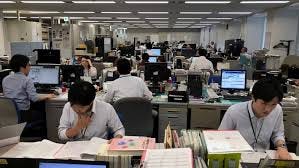I bitch about my old job frequently. Even though I’ve already left it. Here are some of the things I complain about:
There was no natural light in the office. There was no privacy in the office because the desks didn’t have partitions between them. People seldom were lighthearted or made jokes. There was a rigid and stifling hierarchy. I spent almost the entire day in the same chair. Meetings were longer than a grown whale’s dick.
To be honest, I have described these things as ‘Japanese work culture’ in the past, but it’s hard to say how universal they truly are. Most probably, there are similar stale, illogical, uptight, boring, uncomfortable, flood-lit anus workplaces in the West.
And, to be fair, Japanese labour law does offer a few perks. If you become a ‘seishain’ (fully-fledged regular company employee), it’s surprisingly hard for an employer to fire you. When I was stressed and mentally ill at work, I told my company I WANTED to be fired because I had the mistaken notion, for some reason, that getting sacked gave you a big payout. When I asked what I would have to do to get laid off, their response was that, unless I committed a crime on the premises, they wouldn’t get rid of me. Additionally, as further benefits, my city tax was paid and I got pension contributions and good health insurance.
Regarding overtime… I didn’t do any after the first couple of years and they didn’t pressure me to, possibly because I was a foreigner. But I do remember being among the first to leave every day, and later seeing emails from co-workers that had been sent rather late at night.
Japanese companies are famous for their culture of extreme overtime, sometimes resulting in suicide or death from fatigue. One source I checked online said that in 2023, almost 2,900 people in Japan killed themselves due to problems with their working situation. This, along with the exasperating observance of hierarchy, are legitimate targets for criticism.
But, like I said, there are benefits to Japanese employers… like not being abruptly terminated then escorted from the premises with your belongings in a cardboard box like they sometimes do in America.
So, although I whine a lot about my Japanese office era, it’s somewhat of a nuanced picture. Which brings me to talk about a couple of types of Westerner: the Japan-basher and the unconditional Japan-lover.
When I talk about the Japan-basher I mean that moaner who can only say shitty things about Japan, even if they choose to live here. Everything is a bitter broadside about this country: the burgers are bad, there’s nothing showing at the cinema, people are insincere and walk into you. Blah, blah, fucking blah.
These people are obviously insecure about their home nations and need to snipe at Japan to resuscitate their self-esteem. They see the punctual trains, the safety, beautiful women, cheap restaurants and clean parks and experience the jarring realisation that, despite what they’ve been told for years, West isn’t best. They taste an apple or a strawberry that’s wildly superior to what they buy back home and it hurts. They see vending machines on the streets and know that in their place of birth these appliances would have been ruthlessly vandalised by idiots, and it makes them feel inferior.
But Japan is not perfect, which is why I take a nuanced view. I have encountered, often on Reddit, a certain genre of combative Western Japanophile that bristles indignantly should you comment with even the slightest negativity about their beloved Nihon. Disparage any aspect of Japan and they’ll tell you it’s the same elsewhere or that you don’t understand. I reckon a lot of them are winky tools that probably don’t even live here and spend half their day dreaming about the Japanese wife they’ll meet somewhere between the airport and the hotel one day when they vacation in Tokyo. For them, the act of constantly glazing Japan makes them feel superior to other Westerners out of some perception that they are privy to recondite cultural understanding.
As I said, though, I am in the middle.
I adore so many things about this country, like the food and the mountains and the wonderfully, blissfully, beautifully safe public spaces. And the immaculate, punctual, dirt-cheap public transport that opens up the entire place to easy exploration.
But then there’s the overtime (which I was spared), the hierarchy, the suicide, deaths from overwork, and crushing social conventions. As with anywhere, you cannot be entirely positive or entirely negative about Japan, even though you can make a solid argument that its good easily outweighs its bad.
I suspect, after twenty years of residence here, that it is the very rigidity of Japan, its hierarchy, tradition and reticence towards chaotic improvisation that has kept it safe and functional. It can be predictable, stuffy even, but it’s the religious determination to maintain time-tested practices, to fetishistically ensure the smooth turn of every cog, that moves the machine as a harmonious whole.
Japanese companies can be frustrating, slow-moving ships. I know because I spent ten years on one. But they make reliable employers and, if you can shut up, enjoy the view, and keep most of your opinions boxed in, they do have things to recommend them.
Part 24 is here.
You can see the previous part of this series here.



